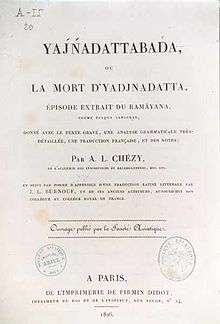Antoine-Léonard de Chézy
Antoine-Léonard de Chézy (15 January 1773 – 31 August 1832) was a French orientalist.

Biography
He was born at Neuilly. His father, Antoine de Chézy (1718–1798), was an engineer who finally became director of the École des Ponts et Chaussées. The son was intended for his father's profession; but in 1799 he obtained a post in the oriental manuscripts department of the national library.[1] In about 1803, he began studying Sanskrit, and although he possessed no grammar or dictionary, he succeeded in acquiring sufficient knowledge of the language to be able to compose poetry in it.
He was the first professor of Sanskrit appointed in the Collège de France (1815), where his pupils included Alexandre Langlois, Auguste-Louis-Armand Loiseleur-Deslongchamps and especially Eugène Burnouf, who would become his successor at the Collège in 1832.[2] He was a chevalier of the Légion d'honneur, and a member of the Académie des Inscriptions. Among his works were:
- Medjnoun et Leïla (1807), from the Persian.
- Yadjnadatta-badha ou la mort d'Yadjnadatta (1814).
- La Reconnaissance de Sacountala (1830), from the Sanskrit.
- Anthologie érotique d'Amarou (1831), published under the pseudonym A. L. Apudy.
See the Mémoires of the Académie des Inscriptions (new series, vol. xii.), where there is a notice of Chézy by Silvestre de Sacy.
See also
References
 This article incorporates text from a publication now in the public domain: Chisholm, Hugh, ed. (1911). "Chézy, Antoine Léonard de". Encyclopædia Britannica (11th ed.). Cambridge University Press.
This article incorporates text from a publication now in the public domain: Chisholm, Hugh, ed. (1911). "Chézy, Antoine Léonard de". Encyclopædia Britannica (11th ed.). Cambridge University Press. Arthur F. J. Remy (1913). "Antoine-Léonard de Chézy". In Herbermann, Charles. Catholic Encyclopedia. New York: Robert Appleton Company.
Arthur F. J. Remy (1913). "Antoine-Léonard de Chézy". In Herbermann, Charles. Catholic Encyclopedia. New York: Robert Appleton Company.
- ↑ Views of the Cordilleras and Monuments of the Indigenous Peoples by Alexander von Humboldt, J. Ryan Poynter, Giorleny D Altamirano Rayo, Tobias Kraft
- ↑ Hindu Myth, Hindu History, Religion, Art, and Politics by Heinrich von Stietencron